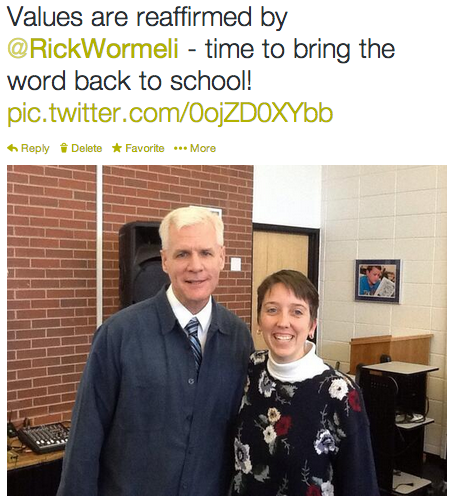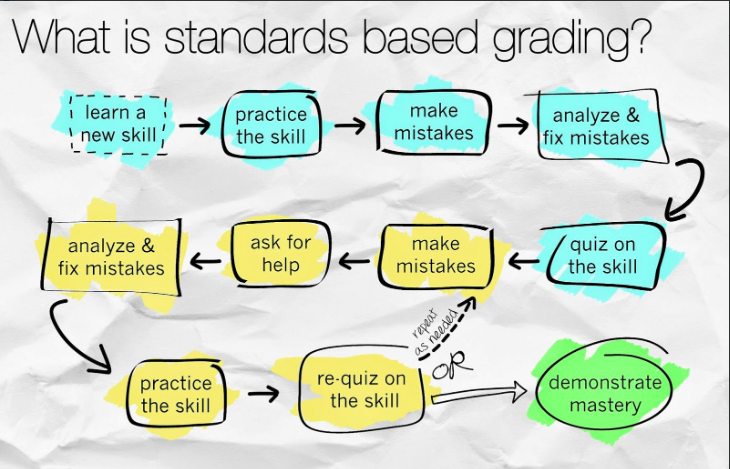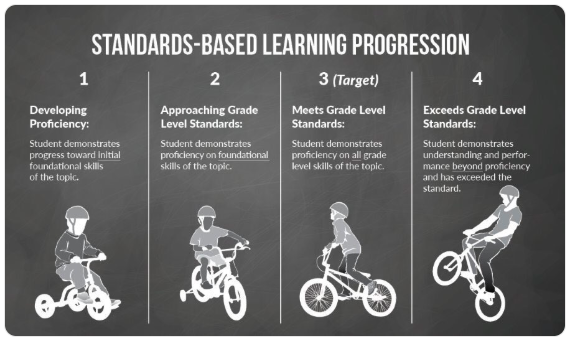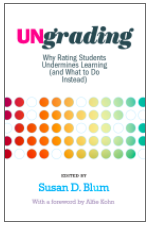I am so very excited our elementary schools have moved to standards-based grading! Soon I will not be on an island trying to make grading fair for my seventh graders. Click here for information from AHSD25 on the WHY and the HOW of standards-based grading.
My grading philosophy has changed drastically throughout my teaching career. When our district brought in Rick Wormeli in 2014, his ideas pushed my thinking further, and made me want to DO something about the grading system I was currently using. I realized I couldn't continue with typical grades...
Please see this 2021 Parent Letter for explicit information, along with watching this nine-minute video:
Please see this 2021 Parent Letter for explicit information, along with watching this nine-minute video:
Information about how we proceeded with it and how it will look for the school year is located on the "F.A.R." tab of this Weebly. I will be giving a lot of oral and written feedback on what students do in class, and will put this feedback into the online gradebook. Grades do not always provide meaningful feedback about learning. "Feedback is among the most critical influences on student learning. A major aim of the educative process is to assist in identifying these gaps ('How am I going?' relative to 'Where am I going?') and to provide remediation in the form of alternative or other steps ('Where to next?')" (Hattie & Timperly, 102). This connection between where students are headed and how to get them there is where meaningful narrative feedback comes in (Barnes, 73). The most powerful aspect of narrative feedback is the mastery learning it fosters. Grades in this type of environment are typically higher than those in a traditional classroom - because students are redirected to revise and resubmit work to show mastery.
The feedback students receive can be improved upon until the week before grades are due. Students will be encouraged to revise and resubmit any work that does not yet show mastery of learning. "The purpose of schools ought to be to create intellectual communities where students are encouraged to be risk takers, to be curious, to be willing to try and fail, and to be more interested in asking questions than providing answers" (Beers & Probst, 24). Please watch this passionate and knowledgeable educator, Rick Wormeli, as he talks about Redos, Retakes, and Do-Overs (as seen below). This may help explain why extra credit does not have a place in our classroom. Our grades will be based on what we learn, not what we do.
Regarding late work... I expect students to be timely because it benefits them in their achievement of learning goals and habits, and it also helps me. Chronic lateness of work will be dealt with as a behavioral issue - not a grade reduction - with a variety of remedies, including parental notification, a record of missed assignments in my tracking log, and staying after school or during lunch to complete assignments. I do not anticipate much of a problem with this since most of our assignments will be completed during class time.
One nice thing about ELA class is we don't have to learn facts just to regurgitate them for a test. We have to learn processes, how to read closely, and how to rewrite (and rewrite and rewrite) for meaning, substance, and different audiences. We learn to enjoy various pieces of literature and nonfiction, and write authentic responses to what we read. Our learning is for authentic reasons, and large tests (typically based on what students memorized) do not have a place here. I will be giving feedback on short pieces and using these formative assessments to modify and individualize my plans when needed.
All of this being said, I am required to give grades to measure student progress. You will find our rubrics here, unless students are creating their own. You will also find "frequently asked questions" from parents on this page of our website.
The feedback students receive can be improved upon until the week before grades are due. Students will be encouraged to revise and resubmit any work that does not yet show mastery of learning. "The purpose of schools ought to be to create intellectual communities where students are encouraged to be risk takers, to be curious, to be willing to try and fail, and to be more interested in asking questions than providing answers" (Beers & Probst, 24). Please watch this passionate and knowledgeable educator, Rick Wormeli, as he talks about Redos, Retakes, and Do-Overs (as seen below). This may help explain why extra credit does not have a place in our classroom. Our grades will be based on what we learn, not what we do.
Regarding late work... I expect students to be timely because it benefits them in their achievement of learning goals and habits, and it also helps me. Chronic lateness of work will be dealt with as a behavioral issue - not a grade reduction - with a variety of remedies, including parental notification, a record of missed assignments in my tracking log, and staying after school or during lunch to complete assignments. I do not anticipate much of a problem with this since most of our assignments will be completed during class time.
One nice thing about ELA class is we don't have to learn facts just to regurgitate them for a test. We have to learn processes, how to read closely, and how to rewrite (and rewrite and rewrite) for meaning, substance, and different audiences. We learn to enjoy various pieces of literature and nonfiction, and write authentic responses to what we read. Our learning is for authentic reasons, and large tests (typically based on what students memorized) do not have a place here. I will be giving feedback on short pieces and using these formative assessments to modify and individualize my plans when needed.
All of this being said, I am required to give grades to measure student progress. You will find our rubrics here, unless students are creating their own. You will also find "frequently asked questions" from parents on this page of our website.
|
To find out more reasons WHY we're taking this approach to grading, take a look at this online binder (LiveBinder) of resources that has been curated from many teachers and education experts around the world.
|
|
|
Research that has factored into these decisions:Barnes, M. (2015). Assessment 3.0: Throw out your grade book and INSPIRE learning. Thousand Oaks, CA: Corwin.
Barnes, M. (2013). ROLE Reversal: Achieving uncommonly excellent results in the student-centered classrooom. Alexandria, VA: ASCD. Beers, K. & Probst, R. (2013). Notice and Note: Strategies for close reading. Portsmouth, NH: Heinemann. Black, P. & Wiliam, D. (Nov 6, 2001). Inside the Black Box: Raising standards through classroom assessment. Bloom, B. (1968, May). "Learning for Mastery." UCLA Evaluation Comment Vol 1, No. 2. Bower, J. (2011, May 11). My de-grading philosophy Q & A [blog post]. Retrieved from for the love of learning at http://www.joebower.org/2011/05/my-grading-philosophy-q.html . Feldman, J. (Nov/Dec 2017). "Do Your Grading Practices Undermine Equity Initiatives?" Leadership Magazine Guskey, T. (2011). Five obstacles to grading reform. Educational Leadership, 69(3), 16-21. Hattie J., & Timperly H. (2007). The power of feedback. Review of Educational Research, 77(1), 81-112. Hill, D, & Hillman, G. (2018). The Grade Cleanse: A Roadmap to healthy grading. Lebanon, TN: Power of ICU Kittle, P. (2013). Book Love: Developing depth, stamina, and passion in adolescent readers. Portsmouth, NH: Heinemann. Kohn, Alfie. "From Degrading to De-Grading," High School Magazine, March 1999. Pink, D. (2009). Drive: The surprising truth about what motivates us. New York, NY: Penguin. Solarz, P. (2015): Learn Like a Pirate: Empower your students to collaborate, lead, and succeed. San Diego, CA: Dave Burgess Consulting. Wormeli, R. (2006). Fair Isn't Always Equal. Portland, ME: Stenhouse. Another HUGE factor in my decision to try grading in this fashion?
Rick Wormeli spoke to AHSD 25 middle school teachers on February 7, 2014! |
SBG ResourcesShift This chapter 7 resources |
|
|
|
|
I contributed a chapter to this book - from blog posts.
You can find it here: https://wvupressonline.com/node/844 |






